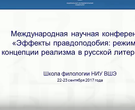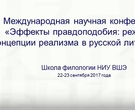- A
- A
- A
- АБB
- АБB
- АБB
- А
- А
- А
- А
- А
- Национальный исследовательский университет «Высшая школа экономики»
- Факультет гуманитарных наук
- Школа филологических наук
- Лекция профессора Университета Тромсе (Норвегия) Лоры Янды
-
Школа
- О школе
- Сотрудники
- Образовательная деятельность
- Научные семинары школы
- Аспирантская школа по филологическим наукам
- Майнор "Инструменты эффективной коммуникации"
-
Проекты школы
-
- Летопись жизни и творчества Б.Л. Пастернака
- Большой проект «Русская литература в социальном измерении: компьютерная платформа СОЦИОЛИТ»
- Всеволод Некрасов. Литературный архив
- Большой проект «Речевые практики»
- Трансформация коммуникативной модели в эго-текстах русского модернизма
- Сравнительное изучение метрического стихосложения на фоне языковой просодии: цифровая аналитическая платформа “Прозиметрон”
-
- Майнор "История литературы"
-
Подразделения
- Лаборатории
- Научно-учебные группы
- Мандельштамовский центр
Адрес: 105066, г. Москва,
Старая Басманная ул., д. 21/4
М.: Издательский дом "Лингва-Ф", 2025.
Wiener Slawistischer Almanach. 2025. Т. 95. С. 203-228.
In bk.: A Danubio ad Gothiam. La christianisation du nord-ouest de la mer Noire dans l’Antiquité tardive – The Christianization of the North-Western Black Sea during Late Antiquity. Turnhout: Brepols Publishers, 2025. P. 37-42.
Лекция профессора Университета Тромсе (Норвегия) Лоры Янды
2 апреля 2012 года на факультете филологии состоялась лекция профессора Университета Тромсе (Норвегия) Лоры Янды ( Laura Janda) “Russian Prefixes as Verb Classifiers”.
I hypothesize that the Russian “purely aspectual” prefixes are a verb classifier system. I present an extensive set of tests for this hypothesis. The tests include comparison of distributional data with definitions for classifier systems, plus five different statistical studies proving that the behavior of each prefix is unique and explainable by recourse to its meaning. All of the evidence confirms the hypothesis and at the same time supports the Vey and van Schooneveld proposal that the prefixes are never “empty” but instead overlap with the meanings of the verbs. My analysis goes beyond the Vey and van Schooneveld overlap proposal in that I establish a specific network of meanings for each prefix, rather than assigning an abstract invariant meaning. Recognizing Russian as a verb classifier language brings numerous advantages, facilitating cross-linguistic comparisons and improving both description and pedagogy
- О ВЫШКЕ
- Цифры и факты
- Руководство и структура
- Устойчивое развитие в НИУ ВШЭ
- Преподаватели и сотрудники
- Корпуса и общежития
- Закупки
- Обращения граждан в НИУ ВШЭ
- Фонд целевого капитала
- Противодействие коррупции
- Сведения о доходах, расходах, об имуществе и обязательствах имущественного характера
- Сведения об образовательной организации
- Людям с ограниченными возможностями здоровья
- Единая платежная страница
- Работа в Вышке
- ОБРАЗОВАНИЕ
- Лицей
- Довузовская подготовка
- Олимпиады
- Прием в бакалавриат
- Вышка+
- Прием в магистратуру
- Аспирантура
- Дополнительное образование
- Центр развития карьеры
- Бизнес-инкубатор ВШЭ
- Образовательные партнерства
- Обратная связь и взаимодействие с получателями услуг
-
http://www.minobrnauki.gov.ru/
Министерство науки и высшего образования РФ
-
https://edu.gov.ru/
Министерство просвещения РФ
-
http://www.edu.ru
Федеральный портал «Российское образование»
-
https://elearning.hse.ru/mooc
Массовые открытые онлайн-курсы
- © НИУ ВШЭ 1993–2025 Адреса и контакты Условия использования материалов Политика конфиденциальности Карта сайта
- Редактору





